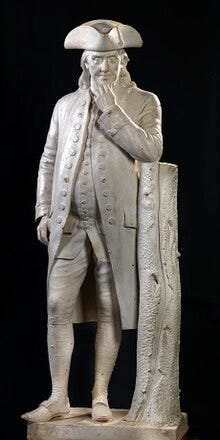To review the life of Benjamin Franklin is to look at a very resourceful but also a complicated and complex man.
Here is a brief listing of his many achievements. Each of these are significant contributions to society and to the betterment of humankind. He was a leading printer, publisher, writer, scientist, inventor, statesman, diplomat, and philosopher. He helped draft the Declaration of Independence and is considered one of the Founding Fathers of the United States. Having helped define what it is to post, he became the first postmaster. He was an ambassador during several crucial periods and was the President of Pennsylvania.
While these are summations of his talents, drilling down a bit provides us with further detail on his accomplishments. He charted the current in the Atlantic and named it the Gulf Stream. He had many inventions that included bifocals, the well-recognized lightning rod, and an efficient stove named after him—the Franklin stove. In the area of civic mindedness, he organized the library, a first fire department in Philadelphia and the educational institution known as the University of Pennsylvania.
Complicated. Benjamin Franklin had achieved many accomplishments as a result of his various, diverse talents. Being complicated is characterized by the need for expertise, that is obtained from specialized knowledge in each area.
Complex. Benjamin Franklin was also a complex man. His internals, like morals and ethics, were—like all of us—many faceted and interconnected. But perhaps more than most he had divergent tendencies.
Franklin came from a home that consisted of seventeen children, from two wives. He said that he was "generally the leader among the boys.” He worked for his father and then his brother learning the printing trade, but then ran away from home as a young teen, from Boston to Philadelphia.
He began arguing against slavery, and was an active abolitionist, expressing that there be education and integration of African Americans. He joined a group of "like minded aspiring artisans and tradesmen who hoped to improve themselves while they improved their community." This was modeled after the coffeehouses of England whereby the spread of Enlightenment ideas took place.
Ben admired the evangelical minister George Whitefield, a key figure during the First Great Awakening, for exhorting that people worship God through doing good works. Franklin helped promote the Great Awakening by published Whitefield's sermons.
Sundays was his study day, and he always had some religious principles, such as the existence of the Deity, that He made the world, and that He governed it by His providence. The most acceptable service of God, in Franklin’s view, was doing good to man, and that crimes are punished, and virtues rewarded, and that our souls are immortal.
As far as morals, Franklin had a common-law marriage, had an affair producing an illegitimate son William, and an amorous time in Paris. Many in this Profiles of Character impress their children to follow their qualities although this was not to be the case with son William Franklin. But his ethics were quite disciplined. He had strong views on ethics and influenced the American views of virtues and morals by constructing the invented first newspaper chain that they could read across the nation.
Franklin had a lifetime passion for virtues, political values, civic work and his publishing competency. His “passion for virtue” included those of the Puritans and this included human equality, education, and industry and the related charity and community spirit. Other virtues were thrift, honesty, and temperance. According to author Thomas Kidd, “As an adult, Franklin touted ethical responsibility, industriousness, and benevolence."
In addition, Franklin has been called "the most accomplished American of his age and the most influential in inventing the type of society America would become." through his inventions and his publishing prowess, he instilled so many values so deeply that he, more than any other, defined the American ethos—the guiding beliefs—of the age.
Through his many talents and inventions and public persona, Benjamin Franklin was a Profile in Character, an archetypal example for the emergent age of America.
Portrait of Benjamin Franklin by Joseph Duplessis, 1778
A statue of Benjamin Franklin by Hiram Powers
Episode16






